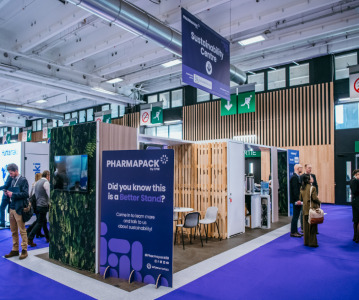CDMOs benefit from COVID-19 impact, says CPHI Annual Report

CMO growth, however, hampered by innovator approvals from mega-cap pharma.
The global contact services sector is benefiting from a switch towards COVID-19 manufacturing (vaccine and therapy) and clinical-stage contracts, but mega-cap innovator drug approvals are reducing commercial demand according to the CPHI Annual Report contract services findings.
Adam Bradbury, Analyst at PharmSource GlobalData, highlighted that mega-cap companies accounted for a particularly high percentage of new drug approvals in 2019, a trend that is potentially detrimental to contract manufacturing organizations' (CMOs) prospects in 2020 and beyond, as such companies with their own internal manufacturing capabilities have less need to outsource manufacturing work.
There remain, however, good opportunities for contract and development manufacturing organizations (CDMOs) in clinical trial manufacturing with a large pipeline of drugs and both mega- and small cap-companies using partners to advance pipelines.
Bradbury also points to increased opportunities for outsourcing of niche technologies – particularly solubility enhancement – as well as a surge in demand for CMOs with viral vector manufacturing capabilities should a number of cell and gene therapies gain regulatory approval over the coming years.
Bradbury commented: “There are a large number of cell and gene therapies in development that will form a future wave of marketed therapies requiring larger scale manufacturing. We may, therefore, see manufacturing bottlenecks in the future, especially in viral vector manufacturing and slow processing, and as such there will be a significant demand for related services.”
COVID-19 is also having a transformative effect on pharma, and Fiona Barry, Associate Editor at PharmSource GlobalData explored the direct and indirect benefits to the CDMO sector.
She highlighted that COVID-19 vaccine developers are signing ‘outsourcing agreements with CMOs at an unprecedented rate’ in response to the global demand for billions of vaccine doses. Consequently, infectious disease has displaced oncology as the leading therapeutic area for contract manufacturing service agreements.
According to the GlobalData Pharma Intelligence Center, pharma companies have publicly disclosed 42 contract manufacturing service agreements for 26 unique pipeline COVID-19 vaccines.
Vaccine developers are choosing to partner with CMOs close to their domestic nations, with the US, UK and Germany proving the most popular supplier locations.
According to Barry, most contract manufacturing service agreements are for recombinant vector vaccines, followed by subunit vaccines. This is despite the fact that mRNA vaccines are the most prevalent among the top COVID-19 vaccines.
“There are extremely few mRNA outsourcing agreements relative to the number of mRNA candidates because of the novelty of this unproven technology. Few CMOs have the capability to produce APIs for mRNA vaccines, and many COVID-19 mRNA dose manufacturing sponsors are opting to partner with Big Pharma rather than outsource this work to CMOs,” commented Barry.
Operation Warp Speed, the $10-billion initiative funded by the US federal government scheme, and the European Commission’s Emergency Support Instrument are two chief drivers of advanced vaccine manufacturing. Both initiatives have selected a number of promising vaccine candidates to manufacture in the hundreds of millions of doses scale.
Finally, an indirect effect of the pandemic is the drive to free up internal capacity at Big Pharma, with outsourcing of some existing products; for example, Pfizer is outsourcing many internally manufactured drugs to CMOs.
Related News
-
News On Track at CPHI NA 2024: Sustainable Futures with Thermo Fisher Scientific
On the 7-9 May 2024 in Philadelphia, CPHI NA will be presenting an unmissable agenda, filled with content across 4 main tracks. In the following interview the Sustainable Futures Track sponsor, Thermo Fisher Scientific gives an overview of what to expe... -
News LEAP-ing into the future of pharma – the CPHI Middle East Vision
On March 6, 2024, the CPHI team hosted the Future of Pharma Forum at LEAP 2024, Saudi Arabia’s premier destination for tech leaders and innovators to meet and collaborate. -
News CPHI Middle East 2024 – What do we have to look forward to?
We’re bringing CPHI to the Middle East in December 2024. CPHI brings together the pharma community from all over the world, creating a platform for education, collaboration, and progress. -
News CPHI Pharma Awards 2023 – Packaging & Machinery Winner: Gasporox
After another year of impressive nominations for the CPHI Pharma Awards our winners were announced at CPHI Barcelona in October 2023. In this series of interviews, we speak to the people and teams behind the award-winning projects, concepts, and techno... -
News Unpacking what we learnt: Key Pharmapack takeaways with L.E.K. Consulting
After another successful Pharmapack show, we sat down with Karin von Kienlin, Senior Partner at L.E.K. Consulting, to discuss the biggest takeaways and surprises from 2 days of intense discussion and collaboration. -
News Key takeaways from Saudi Arabia's National Biotechnology Strategy
In January 2024, Saudi Arabia released its National Biotech Strategy, an ambitious plan to localise biomanufacturing, incentivise R&D and establish the Kingdom as the regional biotech leader by 2030, and an internationally recognised hub by 2040. -
News Pharmapack Awards 2024 Packaging Innovation Award Winner – Nissha Europe GmbH
The 2024 Pharmapack Awards celebrated the best in innovation and design for the pharmaceutical packaging and drug delivery industyr on January 24, 2024. -
News What did we learn from Pharmapack 2024? The green edition
Pharmapack Europe, held in Paris each year is a great opportunity to see the latest innovations and trends in pharmaceutical packaging and to hear from the companies and experts in the area on what aspects are most important to them in their products a...
Position your company at the heart of the global Pharma industry with a CPHI Online membership
-
Your products and solutions visible to thousands of visitors within the largest Pharma marketplace
-
Generate high-quality, engaged leads for your business, all year round
-
Promote your business as the industry’s thought-leader by hosting your reports, brochures and videos within your profile
-
Your company’s profile boosted at all participating CPHI events
-
An easy-to-use platform with a detailed dashboard showing your leads and performance



.png)
.png)

.png)
